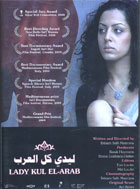
Lady Kul El-Arab 2008
Distributed by Docs for Education, 10a Holland St., Afulla, Israel 18371; fax: 972-3-5291726
Produced by Barak Heymann and Timna Goldstein-Havvav
Directed by Ibtisam Salh Mara’ana
DVD, 56 in,, color
Jr. High - General Adult
Anthropology, Asian Studies, Cultural Traditions, Family, Gender Studies, Jewish Studies. Middle Eastern Studies, Religious Studies, Women’s Studies
Date Entered: 11/19/2012
Reviewed by Caron Knauer, La Guardia Community College, Long Island City, New YorkThis riveting, timely, and beautifully made documentary opens with the announcement at the Miss Israel beauty contest that a contestant named Duah Fares, aka Angelina, has withdrawn. Cutting to six months earlier, the story charts Duah’s trajectory to fulfill her dream of becoming a model and beauty queen as she comes up against the growing pressure from her Druze community to quit.
The Druze, a minority religious Arab group in the Middle East, maintains separate communities. Early on in the film, Duah’s mother tells her, “You as a young Druze lady, will not wear revealing clothes,” and she encourages Duah to enter “Lady Kul El-Arab”, The Lady of the Arab contest. Duah claims that this contest “won’t get her to Hollywood, won’t get her anything.” Duah, a determined and radiant young woman, begins working with a coach, stylist, and the fashion designer Jack Yaakob to pursue her ambition. One stylist tells her and her cohorts, “You’re like eggplants; one can make anything out of you.”
Duah changes her name to Angelina, inspired by Ms. Jolie, and works on her look, on make-up and movement. She’s focused and has her eyes on the prize; however, when the news of Doah’s entry into the Miss Israel contest hits the media, a Druze man speaks out saying that beauty queens and models are unacceptable choices for women. He says that “A woman is not allowed to appear in a bathing suit.” Meanwhile, Duah’s father is imprisoned for theft, and though he supports her decision to follow her bliss, the pressure mounts for her to quit. Her mother tells her she has heard that “The masked men will come and kill you and the whole village will be quiet.” Duah realizes that “True, I’m part of a certain society, but it can’t tell me what to do.” She also comes to realize that in “The Arab sector, there are certain limits to success…since we’re a minority, there’s no way to progress.” Duah and her mother are forced to meet with the community leaders who tell them that violence will ensue if Duah doesn’t withdraw immediately.
Narrative momentum builds as it does in a work of fiction. The arc of the story is dramatic and shaped as artfully as Duah’s eyebrows. Close-ups of Duah enable the viewer to root for her, to feel her excitement and then, her growing anxiety. The cinematographer/director Ibtisam Salh Mara’ana does a magnificent job of showcasing Israel—there’s a breathtaking tracking shot of an Israeli sunrise while Doah’s traveling in a car. The exciting original score by Avi Balleli adds abundant ambience, and the editors Erez Laufer and Miri Laufer do a masterful job. Like the brave, young Pakistani girl, Malala Yousafzai, who was shot by the Taliban for speaking out about girls’ education, Duah’s story is an important and inspiring one. By the sheer force of will, Malala and Duah, the girl from Galilee, are blazing a path for women of all cultures to militate against cultural constraints that limit their progress.
Awards